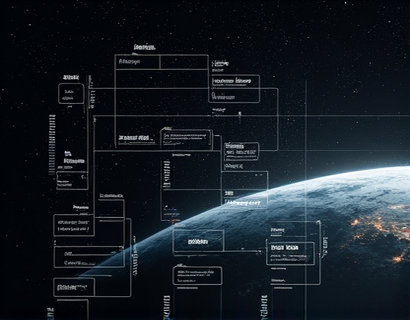Advanced Software Solutions for Streamlining Transportation and Logistics
In the rapidly evolving landscape of transportation and logistics, businesses are constantly seeking ways to enhance efficiency and reduce costs. Advanced software solutions have emerged as a pivotal tool in achieving these goals. These solutions not only streamline supply chains but also enhance delivery accuracy and ensure timely, reliable service for customers. This article delves into the various ways in which sophisticated software can transform transportation and logistics operations, providing a competitive edge in a highly competitive market.
Optimizing Supply Chain Processes
One of the primary benefits of advanced software solutions is their ability to optimize supply chain processes. These systems integrate various components of the supply chain, from procurement to distribution, into a cohesive and efficient workflow. By leveraging real-time data and advanced analytics, these platforms can identify bottlenecks, predict demand fluctuations, and adjust operations accordingly. This level of visibility and control enables businesses to make informed decisions, reduce lead times, and minimize inventory costs.
For instance, predictive analytics can forecast demand with high accuracy, allowing companies to adjust production and inventory levels proactively. This reduces the risk of overstocking or stockouts, which can be costly and detrimental to customer satisfaction. Additionally, advanced software can automate routine tasks such as order processing and supplier management, freeing up staff to focus on more strategic initiatives.
Enhancing Delivery Accuracy
Delivery accuracy is a critical factor in the success of any logistics operation. Advanced software solutions offer robust tools to improve the precision of deliveries. GPS tracking and real-time location systems ensure that vehicles and goods can be monitored at all times, providing up-to-date information on delivery status. This transparency builds trust with customers and helps in managing expectations.
Furthermore, these systems can integrate with warehouse management systems to optimize picking and packing processes. By assigning tasks based on real-time availability and location of items, the software minimizes errors and ensures that orders are prepared and shipped accurately and promptly. This not only enhances customer satisfaction but also reduces the likelihood of returns and complaints.
Reducing Operational Costs
Cost reduction is a primary concern for transportation and logistics businesses. Advanced software solutions can significantly lower operational expenses through various means. One key area is route optimization, where software algorithms analyze traffic patterns, road conditions, and other factors to determine the most efficient routes for deliveries. This reduces fuel consumption, lowers emissions, and cuts down on driver idle time, all of which contribute to cost savings.
Another cost-saving feature is fleet management. Advanced software can monitor vehicle performance, schedule maintenance, and optimize usage, extending the lifespan of fleet assets and reducing repair costs. Additionally, these systems can help in negotiating better rates with suppliers and carriers by providing detailed insights into usage patterns and demand forecasts.
Improving Customer Service
Customer service is paramount in the transportation and logistics industry. Advanced software solutions enhance the customer experience by providing real-time tracking and updates. Customers can monitor the status of their shipments through user-friendly dashboards, receiving notifications at key stages of the delivery process. This level of transparency and communication fosters trust and loyalty.
Moreover, advanced software can facilitate seamless communication between different stakeholders, including customers, carriers, and internal teams. Integrated communication tools ensure that everyone is on the same page, reducing misunderstandings and delays. This holistic approach to customer service not only improves satisfaction but also encourages repeat business and positive referrals.
Scalability and Flexibility
As businesses grow, their transportation and logistics needs evolve. Advanced software solutions are designed to be scalable and flexible, adapting to the changing requirements of the business. Whether a company is expanding its operations, entering new markets, or managing seasonal fluctuations, these systems can scale accordingly without compromising performance.
Cloud-based solutions, in particular, offer the advantage of accessibility and ease of use. They allow employees to access critical data and perform tasks from anywhere, at any time, which is especially beneficial for companies with a distributed workforce. This flexibility ensures that operations remain efficient and responsive, regardless of the business environment.
Compliance and Security
Compliance with regulatory standards and data security is a critical aspect of transportation and logistics. Advanced software solutions are built with compliance in mind, ensuring that all processes adhere to industry regulations such as GDPR, HIPAA, and others. These systems implement robust security measures to protect sensitive data, including encryption, access controls, and regular audits.
By maintaining compliance and safeguarding data, businesses can avoid legal penalties and reputational damage. This peace of mind allows companies to focus on growth and innovation, knowing that their operations are secure and compliant.
Case Studies and Real-World Applications
To illustrate the practical benefits of advanced software solutions, consider a few real-world examples. A major e-commerce company implemented a comprehensive logistics management system that integrated their warehouse, transportation, and customer service operations. The result was a 30% reduction in delivery times and a 25% decrease in operational costs. The enhanced accuracy in order fulfillment led to a significant drop in return rates and an increase in customer satisfaction scores.
Another example is a fleet management company that adopted an advanced route optimization tool. By optimizing routes based on real-time traffic data, the company reduced fuel consumption by 15% and improved driver productivity. This not only cut costs but also contributed to a lower carbon footprint, aligning with the company's sustainability goals.
Future Trends and Innovations
The landscape of transportation and logistics software is continually evolving, with new technologies and innovations on the horizon. One emerging trend is the integration of artificial intelligence (AI) and machine learning (ML) to further enhance decision-making and automation. AI can analyze vast amounts of data to identify patterns and insights that humans might miss, enabling more proactive and precise operations.
Another exciting development is the use of blockchain technology to ensure transparency and traceability in supply chains. Blockchain can provide an immutable record of transactions, making it easier to track the origin and movement of goods. This enhances trust and accountability, particularly in industries where authenticity and quality are paramount.
Additionally, the rise of autonomous vehicles and drones is set to revolutionize last-mile delivery. Advanced software will play a crucial role in managing these new modes of transportation, optimizing routes, and ensuring safe and efficient operations.
Conclusion
In conclusion, advanced software solutions offer a multitude of benefits for transportation and logistics businesses. By optimizing supply chain processes, enhancing delivery accuracy, reducing operational costs, and improving customer service, these tools provide a competitive edge in a dynamic market. As technology continues to advance, the potential for further innovation and efficiency gains is immense. Embracing these solutions is not just a strategic advantage but a necessity for businesses aiming to thrive in the modern logistics landscape.










































